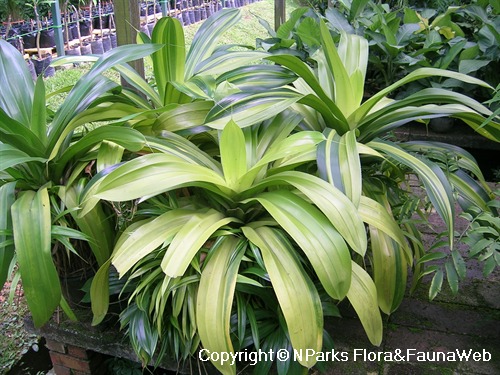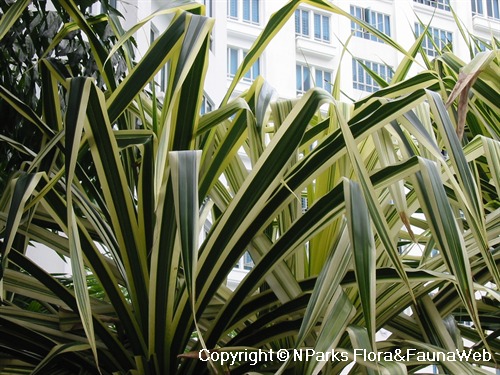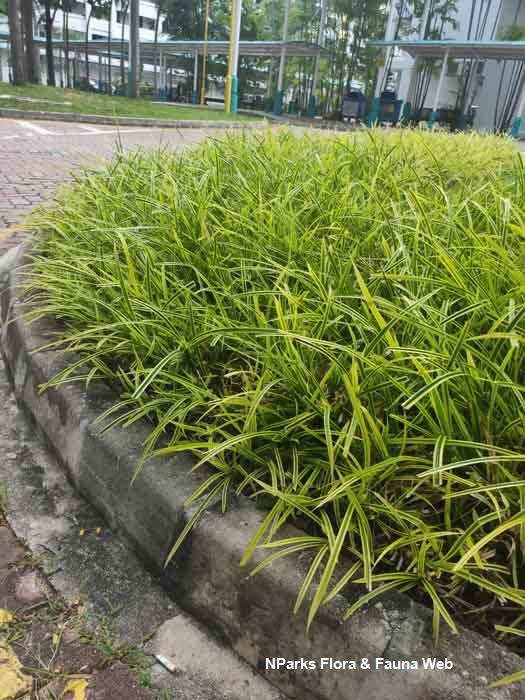
Back
Pandanus pygmaeus Thouars
| Family Name: | Pandanaceae |
| Synonyms: | Freycinetia leucacantha Miq., Foullioya graminifolia H.Wendl., Freycinetia racemosa Gaudich., Pandanus racemosus Kurz |
| Common Name: | Pygmy Screwpine, Small Screwpine, Dwarf Screwpine, 禾叶露兜树, 矮露兜树 |
Name
Classifications and Characteristics
| Plant Division | Angiosperms (Flowering Seed Plants) (Monocotyledon) |
|---|---|
| Plant Growth Form | Herbaceous Plant, Creeper |
| Lifespan (in Singapore) | Perennial |
| Mode of Nutrition | Autotrophic |
| Plant Shape | Dwarf |
| Maximum Height | 0.3 m to 0.6 m |
Biogeography
| Native Distribution | North and East Madagascar |
|---|---|
| Native Habitat | Terrestrial (Monsoon Forest, Riverine) |
| Preferred Climate Zone | Sub-Tropical / Monsoonal |
Description and Ethnobotany
| Growth Form | It is a small, herbaceous, monocot groundcover, growing up to only 0.6m in height when planted in the ground. Low clumping form, aboveground stem not obvious, sending out basal runners that root upon ground contact. |
|---|---|
| Foliage | The leaves is linear, striped with green centre and bright yellow edges. The leaves are spirally arranged around around a hidden stem. The leaf margins and keels are armed with numerous hooked spines. |
| Flowers | The flowers are cream-coloured and produced in inconspicuous clusters on a short peduncle (inflorescence stalk). The species is dioecious (male and female flowers are found on separate plants). In Singapore, the plant seldom blooms, and only male inflorescence has been observed. |
| Habitat | It is found in freshwater wetlands, rock faces and near forested sites. |
| Taxonomy | This species is among the smallest in the genus Pandanus. This form is possibly a cultigen; all variegated individuals might be propagated from a single variegated male plant. |
| Cultivation | It is a hardy species, somewhat drought-tolerant when established, though it prefers regular watering. It is propagated by division and rhizome cuttings. Beware of foliar spines, and use thick gloves when handling the plant or plant materials. |
| Etymology | The generic epithet Pandanus is Latinised form of the Malay name 'pandan'. The specific epithet pygmaeus means 'pygmy', in reference to the plant's dwarf form. |
Landscaping Features
| Desirable Plant Features | Ornamental Foliage |
|---|---|
| Landscape Uses | General, Flowerbed / Border, Coastal, Container Planting |
| Thematic Landscaping | Golden Garden, Naturalistic Garden |
| Usage Hazard - Cons | Spines/Thorns - Leaf |
Plant Care and Propagation
| Light Preference | Full Sun |
|---|---|
| Water Preference | Moderate Water |
| Plant Growth Rate | Moderate |
| Rootzone Tolerance | Fertile Loamy Soils, Waterlogged Soils (Drains Site), Saline Soils / Salt Spray, Drought Tolerant |
| Maintenance Requirements | Moderate |
| Propagation Method | Storage Organ, Division |
Foliar
| Foliage Retention | Evergreen |
|---|---|
| Mature Foliage Colour(s) | Green, Yellow / Golden |
| Mature Foliage Texture(s) | Smooth, Glossy / Shiny |
| Foliar Modification | Spine (axillary) |
| Foliar Type | Simple / Unifoliate |
| Foliar Arrangement Along Stem | Spiral |
| Foliar Shape(s) | Non-Palm Foliage (Linear) |
| Foliar Venation | Parallel |
| Foliar Margin | Entire |
| Foliar Apex - Tip | Acuminate |
| Typical Foliar Area | Notophyll ( 20.25cm2 - 45 cm2 ) |
| Leaf Area Index (LAI) for Green Plot Ratio | 3.5 (Shrub & Groundcover - Monocot) |
Non - Foliar and Storage
| Stem Type & Modification | Acaulescent |
|---|---|
| Root Type | Underground (Fibrous Root) |
| Specialised Storage Organ(s) | Underground (Rhizome) |
Floral (Angiosperm)
| Flower & Plant Sexuality | Unisexual Flowers , Dioecious |
| Flower Colour(s) | Cream / Off-White |
|---|
| Flowering Period | Rarely |
| Flowering Habit | Polycarpic |
Image Repository
Others
| Master ID | 1007 |
|---|---|
| Species ID | 2301 |
| Flora Disclaimer | The information in this website has been compiled from reliable sources, such as reference works on medicinal plants. It is not a substitute for medical advice or treatment and NParks does not purport to provide any medical advice. Readers should always consult his/her physician before using or consuming a plant for medicinal purposes. |

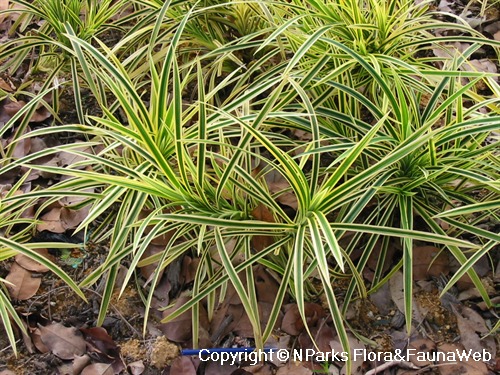
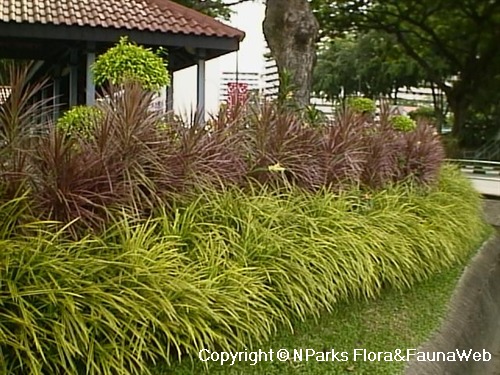
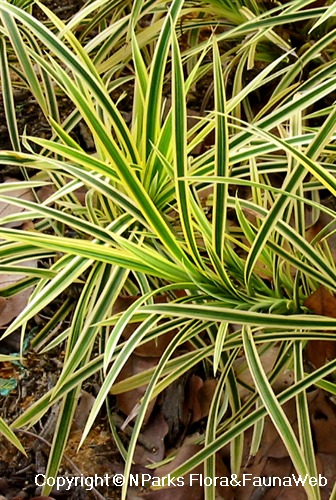
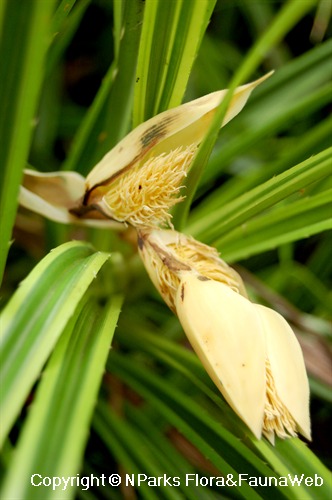
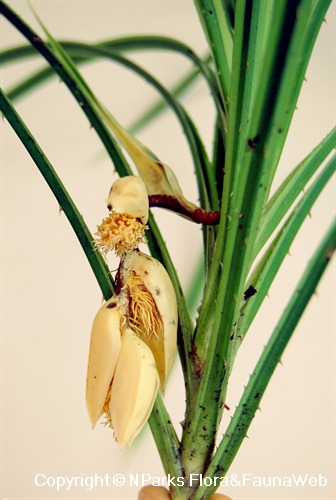
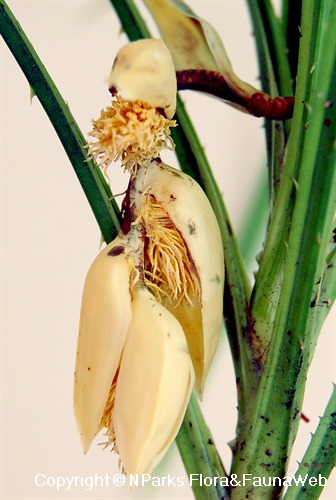
.jpg)

